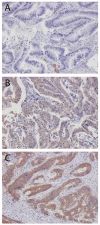HMG-CoA reductase expression in primary colorectal cancer correlates with favourable clinicopathological characteristics and an improved clinical outcome
- PMID: 24708688
- PMCID: PMC4000148
- DOI: 10.1186/1746-1596-9-78
HMG-CoA reductase expression in primary colorectal cancer correlates with favourable clinicopathological characteristics and an improved clinical outcome
Abstract
Background: An association between tumor-specific HMG-CoA reductase (HMGCR) expression and good prognosis has previously been demonstrated in breast and ovarian cancer. In this study, the expression, clinicopathological correlates and prognostic value of HMGCR expression in colorectal cancer was examined.
Findings: Immunohistochemical expression of HMGCR was assessed in tissue microarrays with primary tumours from 557 incident cases of colorectal cancer in the Malmö Diet and Cancer Study. Pearson's Chi Square test was applied to explore the associations between HMGCR expression and clinicopathological factors and other investigative biomarkers. Kaplan Meier analysis and Cox proportional hazards modeling were used to assess the relationship between HMGCR expression and cancer-specific survival (CSS) according to negative vs positive HMGCR expression. A total number of 535 (96.0%) tumours were suitable for analysis, of which 61 (11.4%) were HMGCR negative. Positive cytoplasmic HMGCR expression was associated with distant metastasis-free disease at diagnosis (p = 0.002), lack of vascular invasion (p = 0.043), microsatellite-instability (p = 0.033), expression of cyclin D1 (p = <0.001) and p21 (p = <0.001). Positive HMGCR expression was significantly associated with a prolonged CSS in unadjusted Cox regression analysis in the entire cohort (HR = 1.79; 95% CI 1.20-2.66) and in Stage III-IV disease (HR = 1.71; 95% CI 1.09-2.68), but not after adjustment for established clinicopathological parameters.
Conclusions: Findings from this prospective cohort study demonstrate that HMGCR is differentially expressed in colorectal cancer and that positive expression is associated with favourable tumour characteristics and a prolonged survival in unadjusted analysis. The utility of HMGCR as a predictor of response to neoadjuvant or adjuvant statin treatment in colorectal cancer merits further study.
Virtual slides: The virtual slides for this article can be found here: http://www.diagnosticpathology.diagnomx.eu/vs/2115647072103464.
Figures


References
-
- Borgquist S, Djerbi S, Ponten F, Anagnostaki L, Goldman M, Gaber A, Manjer J, Landberg G, Jirstrom K. HMG-CoA reductase expression in breast cancer is associated with a less aggressive phenotype and influenced by anthropometric factors. Int J Cancer. 2008;123(5):1146–1153. doi: 10.1002/ijc.23597. - DOI - PubMed
-
- Brennan DJ, Laursen H, O’Connor DP, Borgquist S, Uhlen M, Gallagher WM, Ponten F, Millikan RC, Ryden L, Jirstrom K. Tumor-specific HMG-CoA reductase expression in primary premenopausal breast cancer predicts response to tamoxifen. Breast Cancer Res. 2011;13(1):R12. doi: 10.1186/bcr2820. - DOI - PMC - PubMed
-
- Bjarnadottir O, Romero Q, Bendahl PO, Jirstrom K, Ryden L, Loman N, Uhlen M, Johannesson H, Rose C, Grabau D, Borgquist S. Targeting HMG-CoA reductase with statins in a window-of-opportunity breast cancer trial. Breast Cancer Res Treat. 2013;138(2):499–508. doi: 10.1007/s10549-013-2473-6. - DOI - PubMed
Publication types
MeSH terms
Substances
LinkOut - more resources
Full Text Sources
Other Literature Sources
Medical
Research Materials

